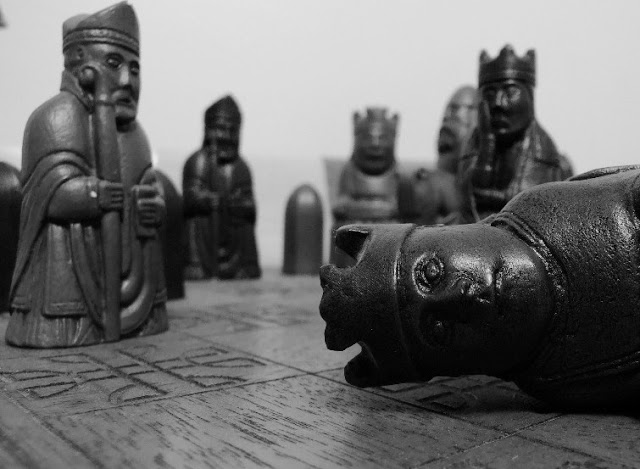By: Ciaran Nagle, Global Marketing Manager, OND LLC
"Not
much is known, of early days of chess beyond a fairly vague report, That
fifteen hundred years ago two princes fought, though brothers, for a Hindu
throne'" (from 'The Story of Chess' written by Tim Rice)
"Not
much is known, of early days of chess beyond a fairly vague report, That
fifteen hundred years ago two princes fought, though brothers, for a Hindu
throne'" (from 'The Story of Chess' written by Tim Rice)
It's 150 years since Wilhelm Steinitz
became the world's first chess champion in 1866. Co-incidentally that's exactly
a tenth of the time since chess was first invented, according to the lyrics of
Tim Rice who wrote the words to the musical 'Chess'. But chess has much to teach us about the
dynamics of building the perfect team.
became the world's first chess champion in 1866. Co-incidentally that's exactly
a tenth of the time since chess was first invented, according to the lyrics of
Tim Rice who wrote the words to the musical 'Chess'. But chess has much to teach us about the
dynamics of building the perfect team.
To begin with, there are six different
types of piece: king, queen, bishop, knight, rook and pawn. Of these, five
represent people and only one, the rook, represents an object, originally a
chariot (now a castle).
types of piece: king, queen, bishop, knight, rook and pawn. Of these, five
represent people and only one, the rook, represents an object, originally a
chariot (now a castle).
So people are more important than tools by
a margin of 5 to 1. All the pieces have different powers. They
move in different ways. It is the combination of their moves and their ability
to leverage each other's strengths that determines which side will win. Chess
really is a team game.
a margin of 5 to 1. All the pieces have different powers. They
move in different ways. It is the combination of their moves and their ability
to leverage each other's strengths that determines which side will win. Chess
really is a team game.
But it's when we look at the talents within
each piece that we uncover the most valuable insight that chess can give us.The queen has shrugged off her 'body of a
weak and feeble woman' as another queen, Elizabeth I, put it and become the
most powerful player on the board. Her inner talent has more than compensated
for her lack of skill with a sword. Natural talent beats skill any day, the
game's designers are trying to tell us.
each piece that we uncover the most valuable insight that chess can give us.The queen has shrugged off her 'body of a
weak and feeble woman' as another queen, Elizabeth I, put it and become the
most powerful player on the board. Her inner talent has more than compensated
for her lack of skill with a sword. Natural talent beats skill any day, the
game's designers are trying to tell us.
The pawns are serfs, peasants. They are
there to be slaughtered. But if a pawn is patient and avoids confrontation and
make its way up the board, it too can become a powerful queen. The message here
is simple but stark: even the least of us conceals hidden talents that allow us
to be leaders when we persist.
there to be slaughtered. But if a pawn is patient and avoids confrontation and
make its way up the board, it too can become a powerful queen. The message here
is simple but stark: even the least of us conceals hidden talents that allow us
to be leaders when we persist.
So on with the other pieces. It is not our
obvious skills that matter, chess is telling us, but our inner talent. It is
not what is on the surface, but what is hidden. When that is unleashed, no-one
can stop us.
obvious skills that matter, chess is telling us, but our inner talent. It is
not what is on the surface, but what is hidden. When that is unleashed, no-one
can stop us.
Method Teaming is a science that uncovers
our own powerful talents and aptitudes. These may have lain hidden, submerged for
years beneath our skills and qualifications. But it's never too late to
discover them. If we do, we may find our inner Queen or Knight and play a
bigger part in our team's success than anyone, even us, thought possible.
our own powerful talents and aptitudes. These may have lain hidden, submerged for
years beneath our skills and qualifications. But it's never too late to
discover them. If we do, we may find our inner Queen or Knight and play a
bigger part in our team's success than anyone, even us, thought possible.
Now just think what could happen if a
science like that was applied to our entire organization.
science like that was applied to our entire organization.
Ciaran was introduced to Method Teaming, OND's ground-breaking science for effective business team formation four years ago. Realizing that his marketing skills, honed at GE over 10 years, could help OND break out of their narrow client set (HPE, Big Four Consultancies) into the wider corporate world he was excited to become their world marketing head. He is based in London and can be reached at ciaran.nagle@methodteaming.com


